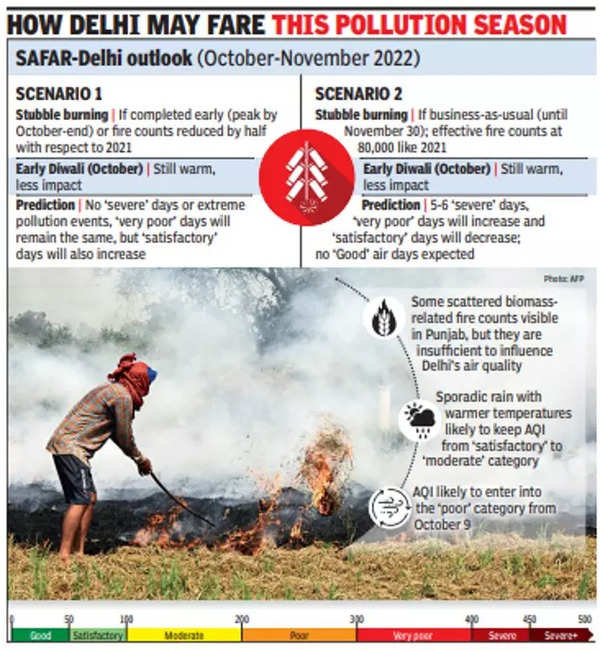Track the pollution level in your city
If the peak season of stubble burning is over by October-end or the fire counts reduce by half of what they were in 2021, there will likely be no ‘severe’ pollution days in October and November.

However, in another scenario, Delhi can suffer five-six ‘severe’ days and a rise in ‘very poor’ days in October and November if the fire count remains around 80,000 like last year, says SAFAR.
SAFAR ran its indigenously developed air quality framework model to analyse the overall winter long-range outlook for October and November based on the two scenarios. “Diwali is much earlier this time than last year. Delhi is still warm and this can cause less stagnation of firework pollutants. If stubble fire count is reduced by half or the peak is over by October-end, Delhi will not see any ‘severe’ days or extreme pollution events. ‘Very poor’ days will remain the same, but ‘satisfactory’ days will increase,” said SAFAR.
However, if stubble burning remains at the same level as last year (the active fire count was 80,000 in October and November), the combination of weather parameters, external intrusion and Diwali impact will still ensure fewer ‘severe’ days than last year. However, there may be five-six ‘severe’ days and more ‘very poor’ days. The ‘satisfactory’ days may be fewer while no ‘good’ days are likely, said SAFAR.
The Central Pollution Control Board’s data shows that Delhi saw its worst November air quality in 2021, with 11 ‘severe’ air days. In contrast, the city breathed its cleanest air last year in October, which had no ‘very poor’ or ‘severe’ days. Experts had said October last year fared better mainly due to intense rain and fewer farm fires.
SAFAR said farm fires hadn’t currently started impacting Delhi’s air quality. “Some scattered biomass-related fire counts are visible in Punjab (fire count was 10 on October 4), but they are insufficient to influence Delhi’s air quality,” said Gufran Beig, founder project director, SAFAR.
Delhi’s AQI is hovering in the ‘moderate’ category with an index of 150 on Tuesday. SAFAR said sporadic rain with warmer temperatures is likely to keep AQI in the ‘satisfactory’ and ‘moderate’ categories for three more days. “However, with the monsoon having withdrawn and calm winds prevailing, AQI will be in the ‘poor’ category from October 9. On October 4, however, the farm fire count at 10 was much lower than last year’s 80,” said Beig.





